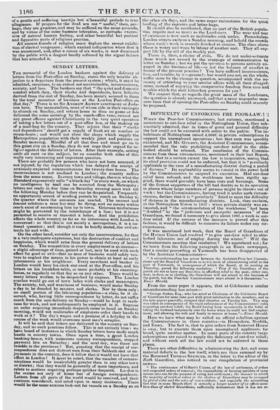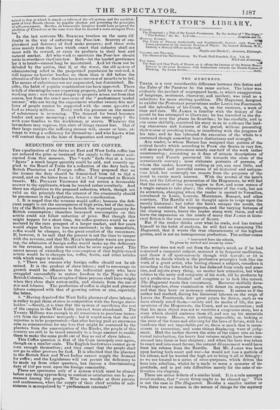DIFFICULTY OF ENFORCING THE POOR-LAW.1
WHEN the Poor-law Commissioners, last autumn, sanctioned a recurrence to out-door relief in the Nottingham Union, they sub- stantially admitted, that in times of great and general difficulty the law could not be executed with safety to the public. The in- habitants of Nottingham raised 4,000/. in private subscriptions to support the unemployed operatives ; but that sum was speedily exhausted, and Mr. GULSON, the Assistant Commissioner, recom- mended that the rule prohibiting out-door relief to the able- bodied should be relaxed. The conclusion of the Commis- sioners from these circumstances, mentioned in their last Report, is not that to a certain extent the law is inoperative, seeing that its chief provision could not be enforced, but that it is "peculiarly applicable to the case of a manufacturing district during a period of distress." Its applicability seems to consist in the power held by the Commissioners to suspend its execution. Had out-door relief been refused, and the workhouse test been rigidly ap- plied, there would probably have been riots and burnings. Some of the firmest supporters of the bill had doubts as to its operation in places where large numbers of persons might be thrown out of work ; but the Commissioners, having tried it under such circum- stances, declare that it is "peculiarly " fitted to meet the difficulty of distress in the manufacturing districts. Look, they exclaim, at the Nottingham Union in 1837 : when private charity was ex. Itausted, and " the accommodation of the workhouse" had been " doubled " by the "judicious and energetic measures" of the Guardians, we found it necessary to give about 100/. a week in out- door relief. If the success of the measure is proved after this fashion, it would be difficult to conceive its failure under any cir- cu instances.
It was mentioned last week, that the Board of Guardians of the Havant Union had resolved " to give out-door relief to able- bodied labourers out of employ during the winter." Will the Commissioners sanction that resolution ? We apprehend not ; for we learn from the following paragraph in an Essex newspaper, that a shriller proceeding at Yarmouth has been disapproved of by the Assistant Commissioner-
" A misunderstanding has arisen between the Assistant-Poor-law Commis- sioner and the Board of Guardians as to the mode of administering relief to the poor of Yarmouth, in consequence of which the Board, at its meeting on Thursday, passed the following resolution; ' That if the Guardians of the parish are not to have any discretion in affording relief to the poor, either out. dour, in.door, or in clothing, the Guardians will not attend to the business of the parish, hut the Poor-law Commissioners must attend to it themselves."— Essex Herald.
From the same paper it appears, that at Colchester a similar misunderstanding has arisen— "George Stokes, Esq., who has acted as Chairman of the Colchester Board of Guardians for some time past with great satisfaction to the members, and to the rate-payers generally, resigned that situation on Tuesday last. This step was taken in consequence of the rigid enforcement of the Commissioners' rules respecting out-door relief; the Board having been occasionally in the habit of taking the husband temporarily into the house when lie could not find employ. meat, and allowing the wife and family to remain at home."—Essex Herald.
Here we have what may be called an official rebellion against the Commissioners in three counties—in Hampshire, Norfolk, and Essex. The fact is, that to give orders from Somerset House is easy, hut to execute them upon unemployed applicants for bread, quite another matter. In many parts of the country large subscriptions are raised to supply the deficiency of out-door relief; and without such aid the law could not be enforced in those places.
There are other difficulties in administering the Act, and some material defects in the law itself, which are thus summed up by the Reverend TuomAs SPENCER, in the letter to the editor of the Bath Guardian, also noticed in our compilation of provincial news- " The continuance of Gilbert's Unions, of the law of settlement, of orders and suspended orders of removal ; the impossibility of forming parishes of some unions into one for the purpose of rating and settlement ; the manner in which the majority of resident voters in the election of Guardians may be swamped by plural votes and the rotes of non.residents ; and especially the astonishing fact that in some Boards there is actually a larger number of ex officio mem- bers than of elected Guardians, sufficiently demonstrate that it has not at- Uinta to that at which it aimed—a reform of the old system, and the establish- ment of local Boards chosen by popular election and possessing the principles of self-government. Besides, an honourable lawgiver would have proposed the abolition of Corn-laws at the same time that he enacted a more stringent Poor.
law."
In the last sentence Mr. SPRNCER, touches on the main dif- ficulty in the way of enforcing the Poor-law. Scarcity of em- ployment and dearness of food make paupers; and these evils arise mainly from the laws which enact that industry shall not meet with its reward, or carry its products to their best and natural market. All who wish to maintain the Poor-law should unite to overthrow the Corn-law. Both—let the landed gentlemen lay it to heart—cannot long be maintained. And let them not be deluded by the notion, that if, at the worst, the old system of administering relief to the pauperized population be restored, it will impose no heavier burden on them than it did before the alteration of the law : there has been an increase of mouths to be fed. The means of subsistence are not augtnented, but diminished. Be- sides, the habit of popular combination has been improved. There is talk of alarnaingtheories respecting property, held by some of the working men : now the real danger to property arises not from that source, but from the cruel measures of the " predominant landed interest," who are trying the experiment whether twenty-five mil- lions of people cannot he supported with the same quantity of food as twenty millions. Every week the pressure on the means of subsistence is increasing. The demand for bread becomes louder and more menacing ; and what is the stern reply ? Go with your families to the workhouse, or starve. Whatever the lawmakers may suppose, this state of things cannot last. Out of their large receipts the suffering masses will, sooner or later, at- tempt to wring a sufficiency for themselves : and who knows what will content them in the hour of desperation and revenge?



























 Previous page
Previous page